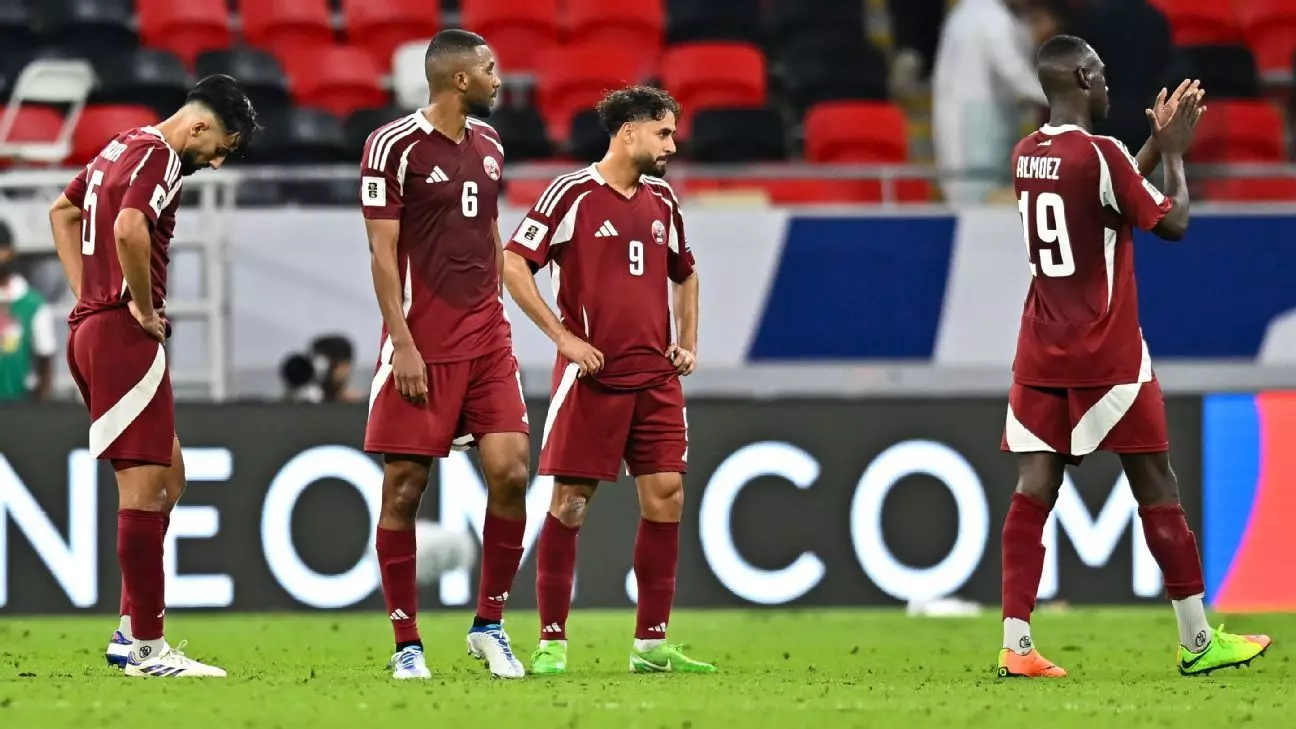Qatar’s aspirations to make a meaningful impact on the world stage after their hosting duties at the 2022 FIFA World Cup have been met with significant challenges. Initially, expectations were high for the Qatari team as they aimed not only to present themselves again as World Cup contenders but to do so through genuine qualification. The expansion of the World Cup to accommodate 48 teams by 2026, coupled with the Asian Football Confederation’s assured allocation of eight spots, seemed to pave a smoother path. Yet, as the Asian qualification campaign unfolds, Qatar finds itself caught in an unexpected quagmire that raises eyebrows and concerns alike.
The Qatar national team, historically dominant in Asian football following their back-to-back AFC Asian Cup victories in 2019 and 2023, now finds themselves in fourth place within their qualifying group. Currently, their numbers tell a distressing story: after six matches, the team has managed only two wins, accumulating a mere seven points. Such figures seem astonishing, particularly when one considers the progression Qatar had made in regional competitions in recent years.
Qatar’s struggles have not been limited to their underwhelming point total. Statistically, they possess the worst defensive record among the competing teams, having conceded a shocking 17 goals. This includes an embarrassing 5-0 loss to the United Arab Emirates, a match that effectively ended as a contest by halftime. The defeat was compounded by experiences earlier in the qualifiers, including a troubling draw against North Korea, a nation devoid of a robust footballing pedigree on the international stage.
The pattern of performance raises questions about the strategic planning and execution within the team. Earlier successes seemed to vanish under the weight of expectations and the realities of competition. Qatar’s quest for World Cup qualification has unveiled glaring vulnerabilities that seemed obscured during their Asian Cup triumphs. The team’s inability to maintain momentum and strength in crucial phases of matches has turned them from titleholders into underperformers.
Examining the leadership makes the situation even more complex. The tactics employed by the head coach, Tintín Márquez, have varied throughout the qualification campaign, oscillating between formations such as 5-3-2 and 4-4-2 without establishing a consistent strategy. This lack of stability in tactical approach appears to contribute to the players’ confusion as they are frequently shuffled among different roles—including significant alterations to key player positions, which disrupts team cohesion.
While Márquez earned accolades for guiding the team to their recent successes, critics might argue that the team’s reliance on veteran players could be hindering the infusion of fresh talent. A careful balance between experience and youth is essential, yet Qatar appears to struggle with this blend. While they boast young prospects, including 19-year-old Ibrahim Al-Hassan, the team’s tactical rigidity has not fully allowed their talents to shine.
However, suggesting that the coach is solely at fault would be overly simplistic. The leadership transition within the squad, particularly following the retirement of long-standing figures like Hassan Al-Haydos, opens the door to uncertainty. Although Akram Afif, a dynamic player, has taken over the captaincy, his style of leadership may not fully align with what the team needs during this tumultuous period.
The present situation puts Qatar in dire straits with the remaining qualification matches looming. The urgency for a strategic overhaul becomes palpable; they must not only accumulate points but also restore confidence and resolve within the squad. A top-four finish is crucial, not merely for the pursuit of World Cup qualification, but for the future stability and direction of Qatari football.
Moreover, this juncture presents an opportunity for introspection. Assessments should delve into both on-pitch strategies and off-field management to cultivate an environment conducive to growth. The current troubling phase in their journey can lead to vital lessons that shape their footballing identity for years to come.
While Qatar’s road to World Cup 2026 appears steep and fraught with challenges, it can potentially foster resilience and a forward-thinking mentality within the football community. A reassessment of priorities, team dynamics, and tactical frameworks may emerge as critical components that restore the Qatari team to their rightful place in the footballing hierarchy. The question now is whether they can seize the moment to reclaim their status as a competitive national team.

